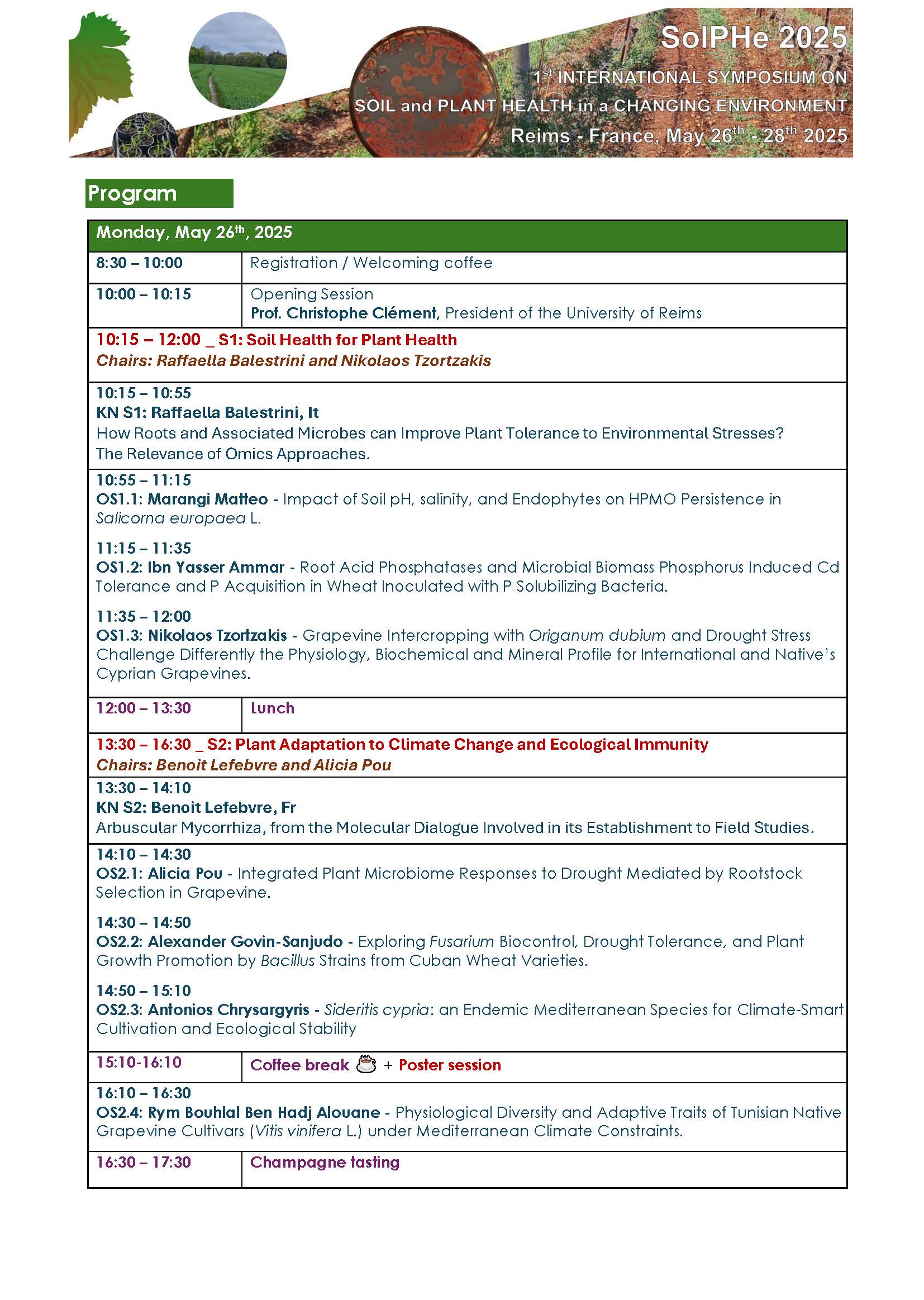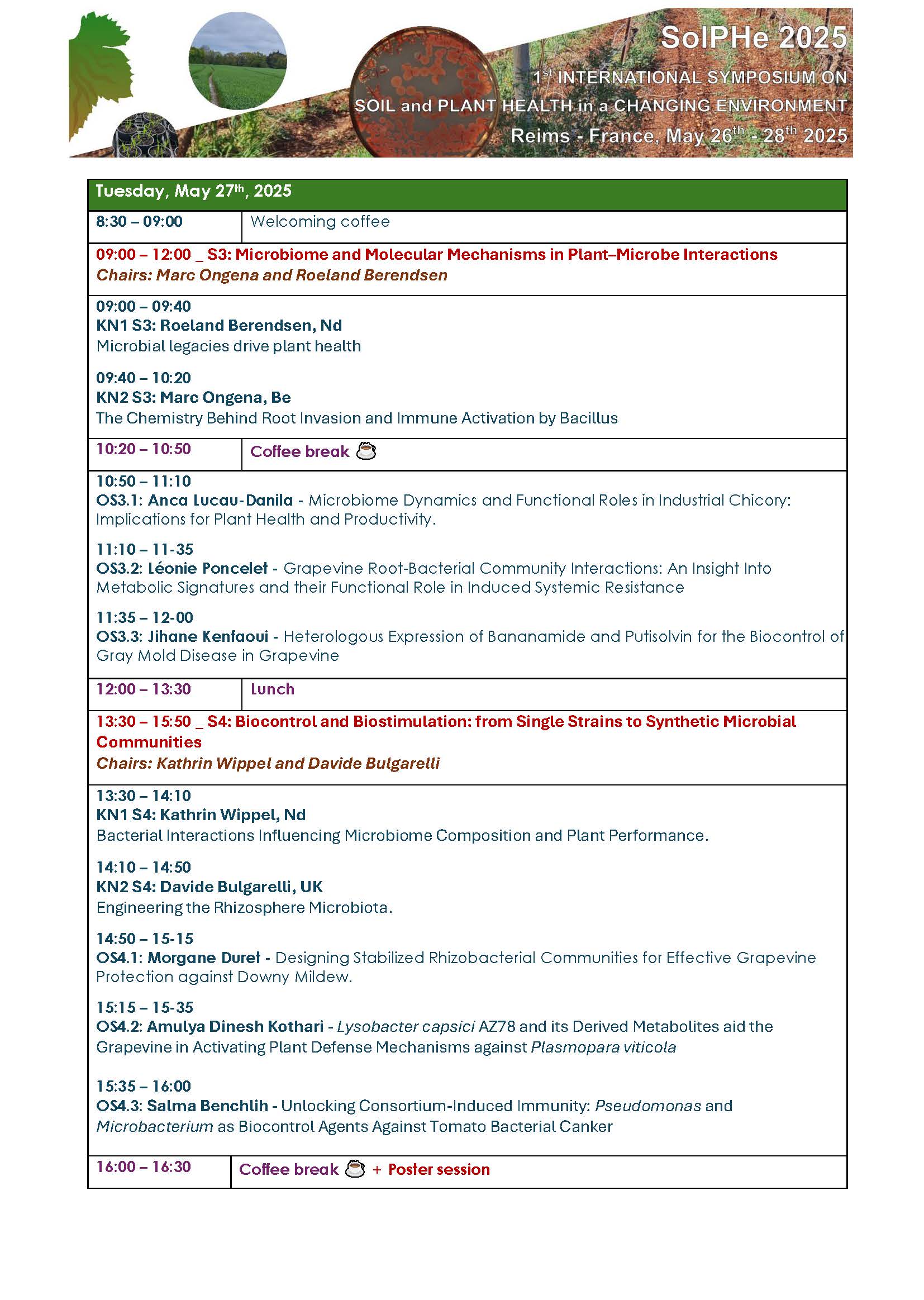Session 1: Soil Health for Plant Health
Soil health is a cornerstone of plant health, influencing plant growth, nutrient uptake, and disease resistance. This session explores the impact of soil quality on plant health in the context of climate change and environmental stressors. Topics will include soil microbiomes, soil organic matter, and sustainable soil management practices to promote plant resilience in a changing world.
Key Topics:
- The role of soil health in plant productivity
- Soil microbial communities and plant-microbe interactions
- Sustainable soil management for climate adaptation
- Impact of soil degradation and restoration efforts
Session 2: Plant adaptation to climate change and ecological immunity
This session will explore how plant immune system is responding to climate change and crosstalk between biotic and abiotic stress signaling pathways. As climate variability continues to affect ecosystems worldwide, understanding the ways in which plants respond to environmental stressors is critical for ensuring food security and ecosystem health. Experts will present insights into plant physiological, genetic, and ecological strategies that enhance resilience against climate-induced threats such as extreme temperatures, drought, and pathogen pressure.
Key Topics:
- Mechanisms of plant adaptation to abiotic stresses
- The impact of climate change on plant-microbe interactions
- The role of plant immunity in responding to climate stressors
- Genetic and epigenetic factors influencing plant resilience
Session 3: Microbiome and Molecular Mechanisms in Plant–Microbe Interactions
The plant microbiome plays a pivotal role in regulating plant growth, nutrient cycling, and disease resistance. This session explores the molecular mechanisms underlying plant–microbe interactions, from beneficial symbioses to plant-pathogen dynamics. Researchers will share the latest insights into how plants recruit and manage their microbiomes for optimal health.
Key Topics:
- Functional genomics of plant-associated microbiomes
- Molecular signaling in plant–microbe interactions
- Pathogen resistance and microbiome manipulation
- Advances in microbiome analysis technologies
Session 4: Biocontrol and Biostimulation: From Single Strains to Synthetic Microbial Communities
Biocontrol agents and biostimulants offer a promising alternative to chemical pesticides, enhancing plant health by harnessing beneficial microbes. This session delves into the application of individual microbial strains as well as complex synthetic microbial communities, and their role in priming plants for enhanced local and systemic immunity, plant resistance and plant growth promotion, and abiotic stress resilience.
Key Topics:
- Mechanisms of action of biocontrol agents and biostimulants
- Advances in synthetic microbial communities for plant protection
- Functional traits of beneficial microbes for plant health
- Regulatory and commercialization challenges
Session 5: Bio-Based Compounds and Induced Plant Immunity
The use of bio-based compounds to induce plant immunity is gaining significant attention as a sustainable approach to plant protection. This session covers the latest research on natural compounds, plant defense signaling pathways, and their potential to bolster plant resistance against pests and diseases.
Key Topics:
- Mechanisms of induced systemic resistance (ISR)
- Role of bio-based compounds in plant immunity
- Applications of plant-derived compounds for crop protection
- Prospects for integrating bio-based compounds into agricultural practices
Session 6: Emerging Technologies in Phenotyping, Plant Breeding, and Technology Transfer
Innovative technologies are transforming the field of plant breeding and phenotyping, enabling more precise selection of traits and accelerating crop improvement. This session highlights the latest advancements in high-throughput phenotyping, genomic selection, and the role of technology transfer in bringing new innovations to farmers.
Key Topics:
- Advanced phenotyping platforms and techniques
- CRISPR and gene editing in plant breeding
- Use of artificial intelligence in plant breeding
- Strategies for effective technology transfer to agricultural communities
Session 7: Environmental Impacts of Plant Protection and Management Practices
Sustainable plant protection practices are essential to minimize the environmental impact of agriculture while maintaining crop health. This session explores the ecological consequences of plant protection methods, including the use of pesticides, herbicides, and integrated pest management strategies. Researchers will discuss the trade-offs between pest control efficacy and environmental sustainability.
Key Topics:
- Environmental risks of chemical pesticides
- Integrated pest management and ecosystem health
- Impact of management practices on biodiversity
- Developing eco-friendly alternatives for plant protection




